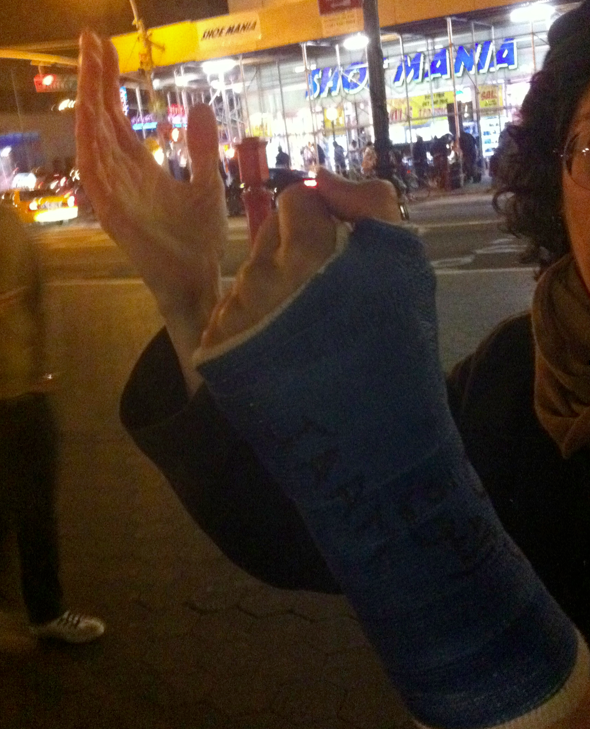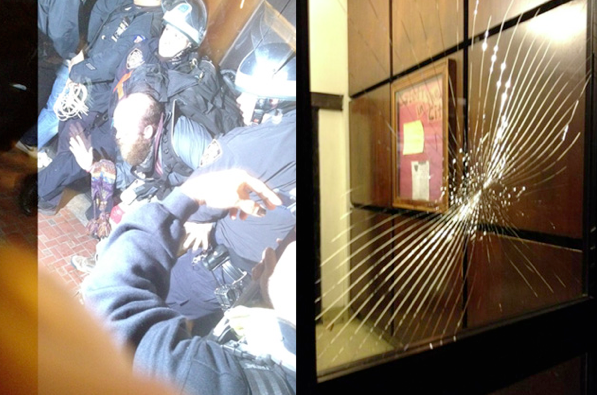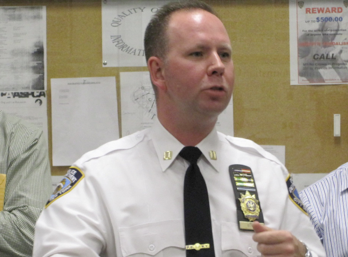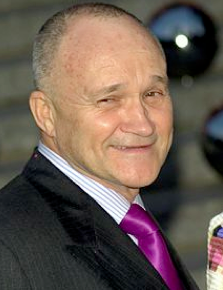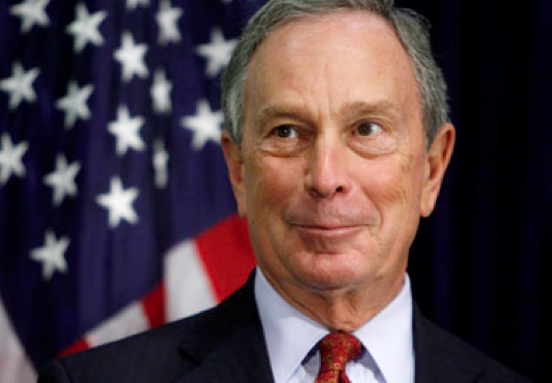David Graeber: New Police Strategy in New York – Sexual Assault Against Peaceful Protestors
By David Graeber, a Reader in Social Anthropology at Goldsmiths, University of London, and an author and activist currently based in New York
A few weeks ago I was with a few companions from Occupy Wall Street in Union Square when an old friend — I’ll call her Eileen — passed through, her hand in a cast.
“What happened to you?” I asked.
“Oh, this?” she held it up. “I was in Liberty Park on the 17th [the Six Month Anniversary of the Occupation]. When the cops were pushing us out the park, one of them yanked at my breast.”
“Again?” someone said.
We had all been hearing stories like this. In fact, there had been continual reports of police officers groping women during the nightly evictions from Union Square itself over the previous two weeks.
“Yeah so I screamed at the guy, I said, ‘you grabbed my boob! what are you, some kind of fucking pervert?’ So they took me behind the lines and broke my wrists.”
Actually, she quickly clarified, only one wrist was literally broken. She proceeded to launch into a careful, well-nigh clinical blow-by-blow description of what had happened. An experienced activist, she knew to go limp when police seized her, and how to do nothing that could possibly be described as resisting arrest. Police dragged her, partly by the hair, behind their lines and threw her to the ground, periodically shouting “stop resisting!” as she shouted back “I’m not resisting!” At one point though, she said, she did tell them her glasses had fallen to the sidewalk next to her, and announced she was going to reach over to retrieve them. That apparently gave them all the excuse they needed. One seized her right arm and bent her wrist backwards in what she said appeared to be some kind of marshal-arts move, leaving it not broken, but seriously damaged. “I don’t know exactly what they did to my left wrist—at that point I was too busy screaming at the top of my lungs in pain. But they broke it. After that they put me in plastic cuffs, as tightly as they possibly could, and wouldn’t loosen them for at least an hour no matter how loud I screamed or how much the other prisoners begged them to help me. For a while everyone in the arrest van was chanting ‘take them off, take them off’ but they just ignored them…”
On March 17, several hundred members of Occupy Wall Street celebrated the six month anniversary of their first camp at Zuccotti Park by a peaceful reoccupation of the park—a reoccupation broken up within hours by police with 32 arrests. Later that evening a break-away group moved north, finally establishing itself on the southern end of Union Square, two miles away, even sleeping in park—though the city government soon after decided to defy a century-old tradition and begin closing the park every night just so they would not be able to establish a camp there. Since then, occupiers have taken advantage of past judicial rulings to continue to sleep on sidewalks outside the park, and more recently, on Wall Street itself.
During this time, peaceful occupiers have been faced with continual harassment arrests, almost invariably on fabricated charges (“disorderly conduct,” “interfering with the conduct of a police officer”—the latter a charge that can be leveled, for instance, against those who try to twist out of the way when an officer is hitting them.) I have seen one protestor at Union Square arrested, by four officers using considerable force, for sitting on the ground to pet a dog; another, for wrapping a blanket around herself (neither were given warnings; but both behaviors were considered too close to “camping”); a third, an ex-Marine, for using obscene language on the Federal steps. Others were reportedly arrested on those same steps for singing a satirical version of the “Officer Krumpke” song from West Side Story. Almost no march goes by without one or two protestors, at least, being hurled against vehicles or have their heads bashed against the ground while being arrested for straying off the sidewalk. The message here is clear. Law has nothing to do with it. Anyone who engages in Occupy Wall Street-related activity should know they can be arrested, for virtually any reason, at any time.
Many of these arrests are carried out in such a way to guarantee physical injury. The tone was set on that first night of March 17, when my friend Eileen’s wrists were broken; others suffered broken fingers, concussions, and broken ribs. Again, this was on a night where OWS actions were confined to sitting in a park, playing music, raising one or two tents, and marching down the street. To give a sense of the level of violence protestors were subjected to, during the march north to Union Square, we saw the first major incident of window-breaking in New York. The window in question was broken not by protestors, but by police—using a protestor’s head. The victim in this case was a street medic named José (owing to the likelihood of physical assault and injuries from police, OWSers in New York as elsewhere have come to carry out even the most peaceful protests accompanied by medics trained in basic first aid.) He offered no resistance.
Here is a video of the incident. The window-breaking begins at 3:45.
Police spokesmen later claimed this incident was a response to a bottle that was hurled at a police vehicle used to transport arrestees. Such claims are made almost automatically when videos appear documenting police assaults on non-violent protestors, yet, despite the presence of cameras everywhere, including those wielded by the police themselves, no actual documentation of any such claims ever seems to appear. This is no exception. In fact numerous witnesses confirmed this simply isn’t true, and even if a bottle had been thrown at an armored vehicle, not even the police have suggested they had any reason to believe the medic whose head was smashed into the window was the one who threw it.
Arbitrary violence is nothing new. The apparently systematic use of sexual assault against women protestors is new. I’m not aware of any reports of police intentionally grabbing women’s breasts before March 17, but on March 17 there were numerous reported cases, and in later nightly evictions from Union Square, the practice became so systematic that at least one woman told me her breasts were grabbed by five different police officers on a single night (in one case, while another one was blowing kisses.) The tactic appeared so abruptly, is so obviously a violation of any sort of police protocol or standard of legality, that it is hard to imagine it is anything but an intentional policy.
For obvious reasons, most of the women who have been victims of such assaults have been hesitant to come forward. Suing the city is a miserable and time-consuming task and if a woman brings any charge involving sexual misconduct, they can expect to have their own history and reputations—no matter how obviously irrelevant—raked over the coals, usually causing immense damage to their personal and professional life. The threat of doing so operates as a very effective form of intimidation. One exception is Cecily McMillan, who was not only groped but suffered a broken rib and seizures during her arrest on March 17, and held incommunicado, denied constant requests to see her lawyer, for over 24 hours thereafter. Shortly after release from the hospital she appeared on Democracy Now! And showed part of a handprint, replete with scratch-marks, that police had left directly over her right breast. (She is currently pursuing civil charges against the police department):
I’d like to emphasize this because when I first mention this, the usual reaction, from reporters or even some ordinary citizens, is incredulity. ‘Surely this must be a matter of a few rogue officers!’ It is difficult to conceive of an American police commander directly telling officers to grope women’s breasts—even through indirect code words. But we know that in other countries, such things definitely happen. In Egypt, for example, there was a sudden spate of sexual assaults by security forces against protestors in November and December 2011, and followed a very similar pattern: while women activists affirmed there had been beatings, but relatively few specifically sexual assaults during the height of the protests, starting in November, there were dozens of reports of women being groped or stripped while they were being beaten. The level of the violence in Egypt may have been more extreme, but the circumstances were identical: an attempt to revive a protest movement through re-occupation is met by a sudden ratcheting up of tactics by the security forces, and in particular, the sudden dramatic appearance of a tactic of sexual attacks on women. It is hard to imagine in either case it was a coincidence. In Egypt, no serious observer is even suggesting that it was.
Of course we cannot how such decisions are made, or conveyed; in fact, most of us find it unpleasant even to contemplate the idea of police officials ordering or encouraging sexual assault against the very citizens they are sworn to protect. But this seems to be precisely what is happening here.
.
For many, the thought of police officials ordering or condoning sexual assault—even if just through a nod or a wink—seems so shocking that absolute proof would be required. But is it really so out of character? As Naomi Wolf has recently reminded us, the US security apparatus has long “used sexual humiliation as a tool of control.” Any experienced activist is aware of the delight police officers so often take in explaining just how certainly they will be raped if placed in prison. Strip searches—which the Supreme Court has recently ruled can be deployed against any citizen held for so much as a traffic violation—are often deployed as a tool of humiliation and punishment. And one need hardly remark on well-documented practices at Guantanamo, Bagram, or Abu Ghraib. Why target women in particular? No doubt it’s partly simply the logic of the bully, to brutalize those you think are weak, and more easily traumatized. But another reason is, almost certainly, the hope of provoking violent reactions on the part of male protestors. I myself well remember a police tactic I observed more than once during the World Economic Forum demonstrations in New York in 2002: a plainclothes officer would tackle a young female marcher, without announcing of who they were, and when one or two men would gallantly try to come to her assistance, uniforms would rush in and arrest them for “assaulting an officer.” The logic makes perfect sense to someone with military background. Soldiers who oppose allowing a combat role for women almost invariably say they do so not because they are afraid women would not behave effectively in battle, but because they are afraid men would not behave effectively in battle if women were present—that is, that they would become so obsessed with the possibility of women in their unit being captured and sexually assaulted that they would behave irrationally. If the police were trying to provoke a violent reaction on the part of studiously non-violent protestors, as a way of justifying even greater brutality and felony charges, this would clearly be the most effective means of doing so.
.
For many, the thought of police officials ordering or condoning sexual assault—even if just through a nod or a wink—seems so shocking that absolute proof would be required. But is it really so out of character? As Naomi Wolf has recently reminded us, the US security apparatus has long “used sexual humiliation as a tool of control.” Any experienced activist is aware of the delight police officers so often take in explaining just how certainly they will be raped if placed in prison. Strip searches—which the Supreme Court has recently ruled can be deployed against any citizen held for so much as a traffic violation—are often deployed as a tool of humiliation and punishment. And one need hardly remark on well-documented practices at Guantanamo, Bagram, or Abu Ghraib. Why target women in particular? No doubt it’s partly simply the logic of the bully, to brutalize those you think are weak, and more easily traumatized. But another reason is, almost certainly, the hope of provoking violent reactions on the part of male protestors. I myself well remember a police tactic I observed more than once during the World Economic Forum demonstrations in New York in 2002: a plainclothes officer would tackle a young female marcher, without announcing of who they were, and when one or two men would gallantly try to come to her assistance, uniforms would rush in and arrest them for “assaulting an officer.” The logic makes perfect sense to someone with military background. Soldiers who oppose allowing a combat role for women almost invariably say they do so not because they are afraid women would not behave effectively in battle, but because they are afraid men would not behave effectively in battle if women were present—that is, that they would become so obsessed with the possibility of women in their unit being captured and sexually assaulted that they would behave irrationally. If the police were trying to provoke a violent reaction on the part of studiously non-violent protestors, as a way of justifying even greater brutality and felony charges, this would clearly be the most effective means of doing so.
There’s a good deal of anecdotal evidence that would tend to confirm that this is exactly what they are trying to do. One of the most peculiar incidents took place on a recent march in New York where police seem to have simulated such an assault, arresting a young women who most activists later concluded was probably an undercover officer (no one had seen her before or has seen her since), then ostentatiously groping her as she was handcuffed. Reportedly, several male protestors had to physically restrained (by other protestors) from charging in to help her.
Why is all this not a national story? Back in September, when the now famous Tony Bologna arbitrarily maced several young women engaged in peaceful protest, the event became a national news story. In March, even while we were still hearing heated debates over a single incident of window-breaking that may or may not have been by an OWS activist in Oakland four months earlier, no one seems to have paid any significant attention to the first major incident of window-breaking in New York—even though the window was broken, by police, apparently, using a non-violent protestors’ head!
I suspect one reason so many shy away from confronting the obvious is because it raises extremely troubling questions about the role of police in American society. Most middle class Americans see the primary role of police as maintaining public order and safety. Instances when police are clearly trying to foment violence and disorder for political purposes so fly in the face of everything we have been taught that our instinct is to tell ourselves it isn’t happening: there must have been some provocation, or else, it must have just been individual rogue cops. Certainly not something ordered by the highest echelons. But here we have to remember the police are an extremely top-down, centralized organization. Uniformed officers simply cannot behave in ways that flagrantly defy the law, in full public view, on an ongoing basis, without having at least tacit approval from those above.
In this case, we also know precisely who those superiors are. The commander of the First Precinct, successor to the disgraced Tony Bologna, is Captain Edward J. Winski, whose officers patrol the Financial District (that is, when those very same officers are not being paid directly by Wall Street firms to provide security, which they regularly do, replete with badges, uniforms, and weapons). Winski often personally directs groups of police attacking protestors:
Winsky’s superior is Police Commissioner Raymond Kelly, former director of global security of the Wall Street firm Bear Stearns:
And Kelly’s superior, in turn, is Mayor Michael Bloomberg – the well-known former investment banker and Wall Street magnate. The 11th richest man in America, he has referred to the New York City Police Department as his own personal army:
One of the great themes of Occupy Wall Street, of course, is the death of US democracy—the near-total capture of our political system by Wall Street firms and the financial power of the 1%. In the beginning the emphasis was on political corruption, the fact that both parties so beholden to the demands of Wall Street and corporate lobbyists that working within the political system to change anything has become simply meaningless. Recent events have demonstrated just how much deeper the power of money really goes. It is not just the political class. It is the very structure of American government, starting with the law and those who are sworn to enforce it—police officers who, as even this brief illustration makes clear, are directly in the pay of and under the orders of Wall Street executives, and who, as a result, are willing to systematically violate their oaths to protect the public when members of that public have the temerity to make a public issue out of exactly these kind of arrangements.
As Gandhi revealed, non-violent protest is effective above all because it reveals how power really operates: it lays bare the violence it is willing to unleash on even the most peaceful citizens when they dare to challenge its moral legitimacy. And by doing so, it reveals the true moral bankruptcy of those who claim authority to rule us. Occupy Wall Street has demonstrated this time and time again. What the current spate of assaults shows is just how low, to what levels of utter moral degradation, such men are really willing to sink.
Update (3:40 PM): In comments, a reader asked why I did not go to the media. My response:
To be honest my first impulse was to call a sympathetic Times reporter. He said he was going to see if he could spin a story out of it. Apparently his editors told him it wasn’t news.

